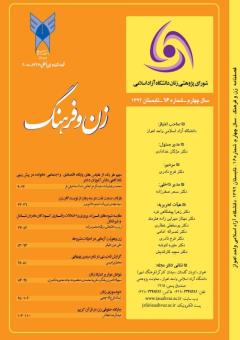زن و هویت آرمانی در ادبیات مشروطه
محورهای موضوعی : تربیت بدنی، مدیریت ورزشی، علوم ورزشی
1 - دانشگاه آزاد اسلامی، واحد رودهن، گروه ادیان و عرفان تطبیقی پژوهشکده قرآن و عترت، رودهن، ایران.
کلید واژه: شعر مشروطه, ادبیات مشروطه, حقوق زنان, women rights, The Constitutional Revolution era literature and poems,
چکیده مقاله :
ادبیات سنّتی ایران بر خلاف آموزه های قرآنی و سنّت معصومین علیهم السلام برای زن حرمتی درخور و شأنی به سزا قائل نمی شد. در این نگاه زن همچون وسیله ای برای خدمت به مرد و پر کردنلحظات او به شمار می رفت، بدون این که از حقوق مساوی برخوردار باشد ویا اینکه حتّی حقّی برایاعتراض داشته باشد. بعد از جریان مشروطه این نگرش دگرگون شد. زنان برای احیای مطالبات حقوقیخود اقدام کردند، مردان نیز به انصاف گرائیدند. رسیدن به شأن انسانی، یافتن منزلت برابر در خانواده واجتماع، فراهم آمدن شرایط مناسب برای تعلیم و حضور در اجتماع و مشارکت در امور سیاسی واجتماعی، ره آوردهای فرخنده ای بود که نهضت مشروطه عاید زنان ساخت. در این مقاله به کوشش چندتن از شاعران مشروطه در تنویر افکار عمومی وتشویق زنان به احیای حقوق خود، اشارات کوتاهی شدهاست. حقوقی که ساختار بیمار اجتماعی، بر خلاف سنّت الهی، به ستم از آنان سلب کرده بود.
Contrary to the Quran trainings and the Maasoumin (The Innocent Sacred, Peace upon them)Sunnah classic Iranian literature did not eligibly respect woman. In such an approach the womanwas considered as pleasing mate for man, while having no equal rights and not even to have a rightto protest. Such an attitude was revised in The Constitutional Revolution after ward era. The womentook actions to reestablish their legal demands and the men declined to justice. To accomplishhumanitarian status, equal position in the family and the society, the preparation of the conditionsled to education and presence in the open social life and the participation in social and political affaireswere all the Constitutional Revolution achievements for women. This paper introduced someof the Constitutional Revolution era poets pointing out to their enlightment efforts of the publicopinion to resume the women right, rights that in contradiction to Divine rules were deprived of thewomen due to disordered social institutions.
_||_

